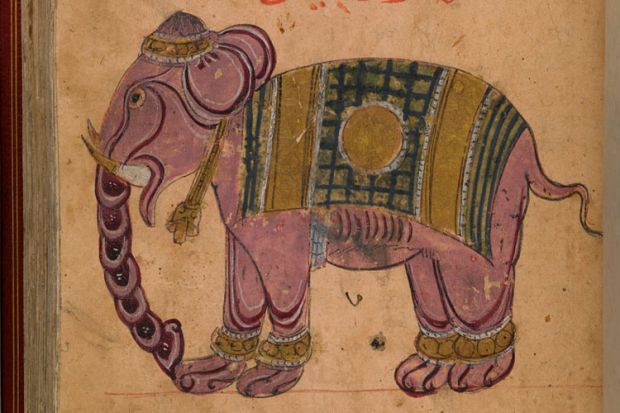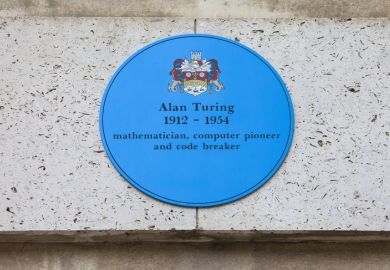The Gulf, according to Nelida Fuccaro, reader in the modern history of the Middle East at Soas, University of London, “has been comparatively neglected by Middle Eastern and British imperial historians.
“To the former until very recently, the Gulf was a sort of nebulous periphery, often perceived as having little or no indigenous history worth looking into,” said Dr Fuccaro. “As to the latter…it is fair to say that only recently have imperial historians started to link, conceptually and geographically, the study of the Gulf to that of British India and the Indian Ocean world. Both are crucial to understanding Gulf history before Indian independence in 1947.”
It is precisely these under-researched areas that should be sharply illuminated and revitalised by one strand of a major digitisation project being pursued by the British Library and Qatar Foundation for Education, Science and Community Development, which is due to go live later this month.
The material is taken from the vast records of the India Office, the government department that ran most of the British Empire from 1858 until it was closed in 1947. Although the Gulf never formally became part of the empire, trading interests steadily increased and, from 1763, a series of political residencies were established.
The two longest-standing of these residencies were in Bushehr, now in Iran, and across the Gulf in Bahrain. Rather than adopting their own selection criteria, those responsible for the digitisation project decided to make available to researchers and the public a discrete, coherent body of material, namely the complete papers - about 475,000 pages - of these two major British residencies.

The contents primarily represent the records of political agents and British government officials working in the Gulf. We can trace the initial stages of their involvement in the region, when they hoped to establish trade concessions and were involved in discussions with local leaders, asking about what commodities were on offer and what languages were spoken. We can then see British interests stepping up a gear from the mid-19th century to a position of effective dominance; changing relations with the rival Austro-Hungarian, Ottoman, Persian and Russian empires; and the development of oil concessions in the 1930s.
Yet the residencies’ papers are not only important for those studying British commercial and imperial strategy. They also reveal many aspects of local history and society such as agriculture, public health, the pearl-fishing industry and pilgrimage to Mecca. As we move into the 20th century, the challenges of new industrial methods, emerging nation states and the impact of global events on the Gulf also come into focus. Equally interesting are the less official perspectives found in some of the private papers (such as those of the intrepid traveller Sir Lewis Pelly, who resided in the Gulf from 1863 to 1872), which are also held in the India Office Records and have now been digitised.
In parallel with the material from the Gulf, the BL-Qatar Foundation partnership is also digitising about 90 of the library’s large collection of medieval Arabic scientific manuscripts, many of them strikingly beautiful. These cover the 10th to 19th centuries, come from Morocco and Oman as well as the major centres in Baghdad, Cairo and Damascus, and represent about 25,000 pages. Translations of Greek authors such as Euclid are included alongside original works of science.
The British Library’s 10-year partnership with the Qatar Foundation, which also includes the Qatar National Library, will continue until 2022. The first stage has cost £8.7 million. About a third of the material described above will be available from this month on a bilingual website incorporating contextual essays. The rest should be accessible by the end of the year. If this first stage goes well, papers from British residencies in Aden, Muscat and Kuwait may be digitised too.

The website will also include cartographic, photographic and other topographic material that sheds additional light on the official papers. A full-time curator is assembling sound recordings, oral history testimonies and information about the musical cultures of the Gulf.
But what will this vast new resource mean for researchers?
There are already British academics working on the development of Arab science. In 2009, Jim Al-Khalili, professor of theoretical physics at the University of Surrey, even presented a three-part television series on Science and Islam. Yet the newly digitised manuscripts will offer far more detail on the Arabic contribution to “the medieval intellectual renaissance”, which led to the foundation of universities in Pisa, Paris, Oxford and Cambridge, and the “scientific revolution” itself. With metadata and search facilities available in Arabic as well as English, scholars from the region will have opportunities to explore this key element of their intellectual history and its centuries of fruitful interaction with the West.
The India Office files, in Dr Fuccaro’s view, “are likely to inspire Gulf scholars and people who are increasingly keen to dig deeper into their own history…online materials and blogs can help to rekindle interest in key themes in Gulf historiography such as the nature of the development of Britain’s ‘informal empire’ in the region and the relationship between British officials and ruling families.
“Perhaps more importantly, they will help to focus attention on themes such as slavery, oil development, transnational communities, colonial knowledge and imperial rituals of power that have not yet featured so prominently in the study of the region, themes that will certainly help to integrate more firmly studies on the Gulf into new regional, national and transnational historiographies of empire.”
Given time and the pursuit of new research angles, perhaps, the Gulf as a region may be “comparatively neglected” no longer.
Register to continue
Why register?
- Registration is free and only takes a moment
- Once registered, you can read 3 articles a month
- Sign up for our newsletter
Subscribe
Or subscribe for unlimited access to:
- Unlimited access to news, views, insights & reviews
- Digital editions
- Digital access to THE’s university and college rankings analysis
Already registered or a current subscriber? Login





